calsfoundation@cals.org
John Storrs Cross (1904–1976)
John Storrs Cross became a national and international expert in all types of electronic communication as a member of the U.S. Department of the Interior, the U.S. Navy during World War II, and the U.S. Department of State, as well as the Federal Communications Commission (FCC). In Arkansas, he was the engineer for Hot Springs National Park in Hot Springs (Garland County) in the 1930s and ran a motel with his wife near Eureka Springs (Carroll County) in the later part of his life.
John S. Cross was born in Birmingham, Alabama, on September 18, 1904, to Thomas C. Cross and Elise T. Cross. He had one younger sister, Elise. In his high school years, he attended the private McCallie School for Boys in Chattanooga, Tennessee. His mother followed him there, running a boarding house to pay for his tuition. He later attended Alabama Polytechnic Institute (now Auburn University), graduating in 1923 with a degree in electrical engineering.
After college graduation, he moved to Detroit, Michigan, and was employed in the thriving automobile industry. He later entered a more lucrative field as a securities salesman until the stock market crash of 1929. Returning to his family, which then resided in South Carolina, he was able to gain employment as a surveyor for the state highway department.
In 1931, during the Great Depression, when federal jobs were scarce, he was able to secure a position as an associate engineer with the U.S. Department of the Interior in Washington DC. The following year, he met his future wife, Ruth Marie Fuller, the daughter of Arkansas congressman Claude A. Fuller and May Fuller. Following his transfer to become engineer for Hot Springs National Park, they were married in Eureka Springs on December 23, 1932. They had two children.
Cross was the engineer in charge of Hot Springs National Park for two and a half years. During this time, he laid out the Grand Promenade between the Arlington Hotel and the former Army and Navy Hospital on Reserve Street. Also, he built a masonry dam in Hot Springs National Park and was in charge of several other projects.
Another move to the headquarters of the Department of the Interior in Washington DC came in early 1935. During the next several years, he rose to become the assistant chief engineer in charge of all the communications to, from, and within all the U.S. national parks.
When the United States entered World War II in December 1941, he immediately volunteered even though he was ineligible for the draft due to age and number of dependents. Both the U.S. Army and the U.S. Navy wanted him because of his communications experience and contacts, but he chose the navy at a lower rank, feeling he would be able to contribute more there. The navy was responsible for all the secure war communications to and from the European and Pacific Theaters and the War Department in Washington DC. As the war in the Pacific moved westward, he was put in charge of establishing and operating the shore radio stations as military campaigns liberated captured islands from the Japanese. During this period, his time was divided between Washington DC and the Pacific Theater. He rose quickly in rank from lieutenant commander to commander and then captain. At the end of the war, he was awarded the Legion of Merit medal for his efforts by the Secretary of the Navy, James Forrestal.
At the end of World War II, when Cross was discharged from the U.S. Navy, he accepted a position as assistant chief of telecommunications in the U.S. State Department. As assistant chief, Captain Cross traveled the world and participated in eighteen international conferences. He also worked closely with representatives of the FCC during these conferences.
On March 10, 1958, Cross was appointed by President Dwight D. Eisenhower to the Federal Communications Commission, to fill the unexpired term of Richard A. Mack. He was confirmed by the U.S. Senate on May 15, 1958, and was sworn in by FCC chairman John C. Doerfer on May 23, 1958. He served until September 30, 1962.
Upon retirement from the federal government in 1962, Cross practiced some consulting, but he mostly devoted himself to running a seasonal motel, Riverview Resort Motel, located on the White River near Eureka Springs. He and his wife had built the motel in 1953, and she and her two sons ran it until August of each year when he joined her, then permanently after his retirement. He joined whenever he could, working full time (seasonally) after retirement.
While he also owned a home in the suburbs of Washington DC, he had considered Eureka Springs home from the time he was married there in 1932. He died on November 8, 1976, and is buried in the Odd Fellows Cemetery in Eureka Springs.
For additional information:
“Cross Is an Old Hand in Radio-TV Field.” Evening Star (Washington DC), March 12, 1958, 6A.
“Funeral Services Announced.” Times-Echo, November 11, 1976, p. 1.
“John Cross, Ex-official of FCC, Dies.” Arkansas Gazette, November 11, 1976, p. 12B.
John Fuller Cross
Eureka Springs, Arkansas
Claude C. Cross
McClellanville, South Carolina
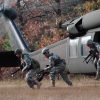

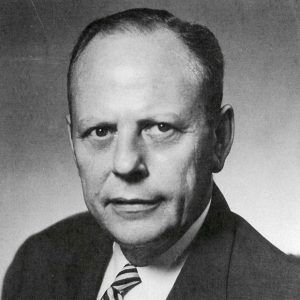
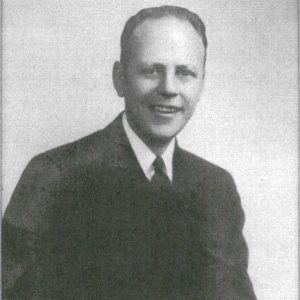
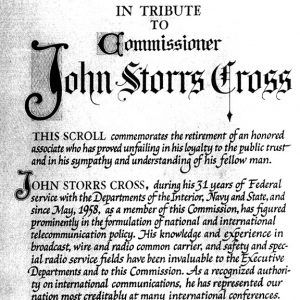
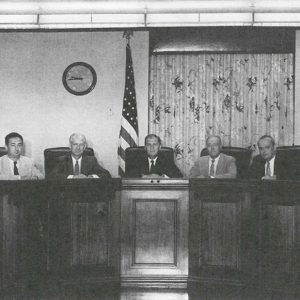




Comments
No comments on this entry yet.